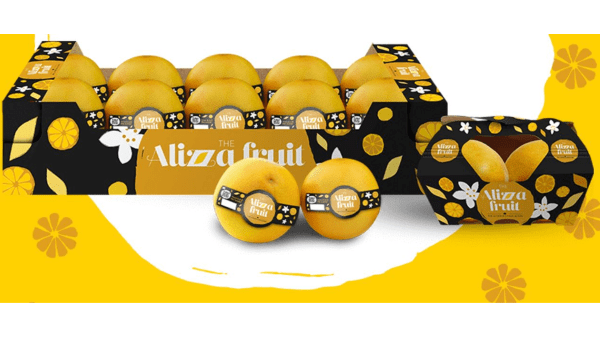
It’s like reviewing a movie that you haven’t seen. But I’ll try my best.
The item in question is a new citrus being introduced into European markets called Alizza. It’s a mandarin and pomelo hybrid developed by Israel’s Volcani Institute and presently being cultivated in Spain by the agritechnical company AM FRESH.
“The ultimate citrus Queen, The ALIZZA Fruit combines the grandeur of a succulent pomelo woven with the joyful intimacy of a sweet and juicy tangerine. Its enticing perfume allures while its copious golden juices quenches,” proclaims the Alizza website in an English that was clearly not written by a native speaker.
The fruit was named in honor of plant breeder Aliza Vardi, “regarded as the saviour of Israel’s citrus industry,” the site says. Among other accomplishments, she is credited with developing the Orri mandarin.
“We are facing a completely new fruit that is going to revolutionize the citrus category, surprising and captivating consumers from different international markets”, says David Alba, director of the Spanish firm Genesis Innovation, which is distributing the fruit.
“Never before has a citrus fruit combined such a size, such a differential organoleptic quality and the incredible amount of juice that the ALIZZA Fruit possesses,” Alba continues.
“Its flavor is difficult to describe, bringing together characteristics reminiscent of the sweetness of mandarins (with tropical notes as in the case of the Orri mandarin, with which it shares a parent), the texture of oranges and a hint of grapefruit. Without a doubt, what will surprise consumers the most is the amount of juice that can be easily extracted from each fruit, with the added advantage that they will not find seeds.”
“Organoleptic,” by the way, means “affecting the senses” (I had to look it up myself), here presumably meaning the fruit’s combined effects on the organs involved with taste and smell.
One unusual claim on the Alizza’s behalf is its antibiotic properties. According to the Institute of Molecular and Cellular Plants of Valencia, Spain, its juice has an antimicrobial effect on Pseudomonas bacteria (the cause of many respiratory illnesses) roughly half of that of tetracycline.
Production will be located at first in Spain and South Africa to ensure a year-round availability of the fruit. It will be initially distributed in three chains: Marks & Spencer in Britain, Edeka in Germany, and Eroski in Spain.
Alizza sounds extraordinarily tempting. If I manage to get hold of some, I’ll let you know how it tastes.
It’s like reviewing a movie that you haven’t seen. But I’ll try my best.
The item in question is a new citrus being introduced into European markets called Alizza. It’s a mandarin and pomelo hybrid developed by Israel’s Volcani Institute and presently being cultivated in Spain by the agritechnical company AM FRESH.
“The ultimate citrus Queen, The ALIZZA Fruit combines the grandeur of a succulent pomelo woven with the joyful intimacy of a sweet and juicy tangerine. Its enticing perfume allures while its copious golden juices quenches,” proclaims the Alizza website in an English that was clearly not written by a native speaker.
The fruit was named in honor of plant breeder Aliza Vardi, “regarded as the saviour of Israel’s citrus industry,” the site says. Among other accomplishments, she is credited with developing the Orri mandarin.
“We are facing a completely new fruit that is going to revolutionize the citrus category, surprising and captivating consumers from different international markets”, says David Alba, director of the Spanish firm Genesis Innovation, which is distributing the fruit.
“Never before has a citrus fruit combined such a size, such a differential organoleptic quality and the incredible amount of juice that the ALIZZA Fruit possesses,” Alba continues.
“Its flavor is difficult to describe, bringing together characteristics reminiscent of the sweetness of mandarins (with tropical notes as in the case of the Orri mandarin, with which it shares a parent), the texture of oranges and a hint of grapefruit. Without a doubt, what will surprise consumers the most is the amount of juice that can be easily extracted from each fruit, with the added advantage that they will not find seeds.”
“Organoleptic,” by the way, means “affecting the senses” (I had to look it up myself), here presumably meaning the fruit’s combined effects on the organs involved with taste and smell.
One unusual claim on the Alizza’s behalf is its antibiotic properties. According to the Institute of Molecular and Cellular Plants of Valencia, Spain, its juice has an antimicrobial effect on Pseudomonas bacteria (the cause of many respiratory illnesses) roughly half of that of tetracycline.
Production will be located at first in Spain and South Africa to ensure a year-round availability of the fruit. It will be initially distributed in three chains: Marks & Spencer in Britain, Edeka in Germany, and Eroski in Spain.
Alizza sounds extraordinarily tempting. If I manage to get hold of some, I’ll let you know how it tastes.
Richard Smoley, contributing editor for Blue Book Services, Inc., has more than 40 years of experience in magazine writing and editing, and is the former managing editor of California Farmer magazine. A graduate of Harvard and Oxford universities, he has published 12 books.




